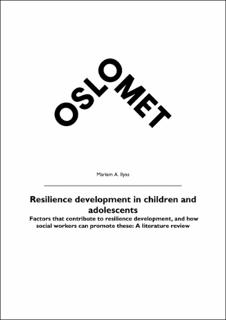| dc.description.abstract | The current thesis focused on children and adolescents who have faced traumatic experiences through childhood but managed to adapt their life around such experiences. More specifically the emphasis was to understand which factors contribute to this resiliency. Furthermore, how can social worker promote these factors through their work. The research question is the following: “What factors contribute to resilience development in children and adolescents who have experienced a traumatic childhood and how can social workers promote such factors?”. The theoretical framework contains “resiliency theory”, “self-efficacy in social cognitive theory”, “Maslow hierarchy of needs”, “strength perspective”, “user involvement”, “person in environment” and “ecological model”. Data-collecting method used in this thesis was literature review. After conducting literature review the selected five articles were further analysed in depth.
Analysing the articles resulted in different findings that were categorized between “internal factors”, “external factors” and “Importance of family support specifically maternal figure”. The most frequently mentioned internal factor was emotion regulation, along with motivation and sense of purpose. Whilst an important external factor was the presence of supportive relationships and access to creative outlets. Lastly, the importance of maternal figure was specifically highlighted through maternal warmth, being protected by a maternal figure and importance of strengthening the maternal figure. Findings indicate that impact of different factors either increased or decreased the resilience in an individual. Subsequently, based on findings from selected articles, relevant theories and social work practice get discussed. The theoretical framework showcases how they align with the factors suggested in findings, and social worker practice. Ecomap indicates that social workers can promote resilience factors on different levels. Directly with children and adolescents can this be done through practicing user involvement, and strength perspective. Person-in-environment theory focuses on internal and external factors. Additionally creative outlets can promote resiliency and can be beneficial in social worker framework. Group interventions are also regarded to have positive impact on promoting resilience in children and adolescents. Finally, thesis concludes with mentioning limitation and suggestions for future research. | en_US |
